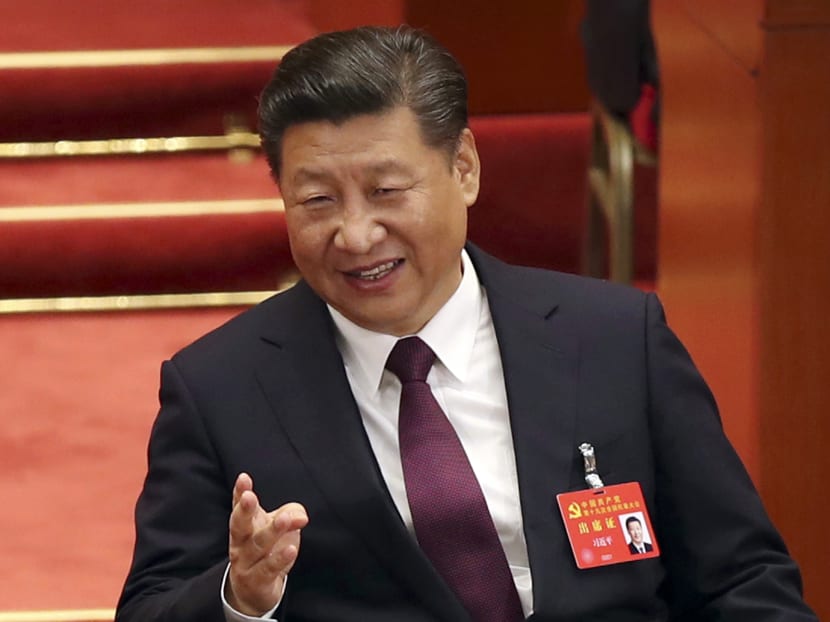Xi’s ambitions on show during epic congress
BEIJING — Unusually for the leader of a country of China’s size and economic weight, Xi Jinping does not give an annual “state of the nation” address.

President Xi surprised his congress audience of about 2,300 delegates by speaking for three-and-a-half hours. Photo: AP
BEIJING — Unusually for the leader of a country of China’s size and economic weight, Xi Jinping does not give an annual “state of the nation” address.
That task instead falls to Premier Li Keqiang, who every March presents a “work report” at the opening of the country’s annual parliamentary session.
So when President Xi on Wednesday spoke at a rare Chinese Communist party congress, which convenes only once every five years, it was arguably his first major public domestic policy speech since assuming power in November 2012.
He made the most of it, surprising his congress audience of about 2,300 delegates by speaking for three-and-a-half hours.
Jiang Zemin, the frail 91-year-old former president who had to be helped to and from his chair beside Mr Xi, looked repeatedly at his watch throughout the epic address.
Online, social media users shared pictures of schoolchildren and monks sitting at attention as they watched blanket state media broadcasts of the speech.
“It reminds me of Big Brother in 1984,” one post read, in a reference to the political broadcasts that never stopped in George Orwell’s dystopian novel.
Five years ago, when then-President Hu Jintao addressed the party congress, his speech lasted a relatively brief 90 minutes. Mr Xi, however, has bigger ambitions than Mr Hu and Mr Jiang.
While his two predecessors were personally endorsed by Deng Xiaoping and therefore closely associated with the late paramount leader, Mr Xi made clear that he expects his presidency to mark the beginning of a bold new era for the world’s second-largest economy.
“The Chinese nation now stands tall and firm in the east,” Mr Xi proclaimed. It was an echo of the famous September 1949 declaration by Mao Zedong, the party’s revolutionary hero, that “the Chinese people, comprising one quarter of humanity, have now stood up”.
That message was duly received by party delegates, who later parroted it in group sessions. “Our party is entering a new era under the core leadership of Xi Jinping,” said Lou Qinjian, the party boss of Shaanxi province.
“We have solved many tough problems that were long on the agenda but never resolved,” Mr Xi added, in a possible reference to Mr Hu’s 10 years in power to 2012.
Many Chinese officials who consider that period a “lost decade” characterised by rampant corruption have welcomed Mr Xi’s stated determination to “realise the Chinese dream of national rejuvenation”. “This [congress] is about politics and political control,” says Jude Blanchette, a China politics expert and Beijing-based analyst with The Conference Board.
Wednesday’s opening session of the Chinese Communist party’s 19th congress was in fact an anticlimactic start to a critically important political conclave. The congress will conclude on October 24 with the revealing of Mr Xi’s new Politburo Standing Committee, the party’s most powerful body.
The new leadership line-up will reveal just how much power China’s president has been able to wield during intense political bargaining, and provide clues about whether he might try to cling to power beyond the traditional 10-year period.
“Xi won’t have a totally free hand to choose his [second-term] team,” says one person who advises Chinese policymakers. “But he’ll probably have as free a hand as it gets.”
Mr Xi is also expected to make a bid for the party constitution to be revised to include a reference to “Xi Jinping Thought” or “Theory”, an honour previously bestowed only on Deng and Mao.
“If Xi gets his name in the constitution then maybe it doesn’t really matter too much who is on the Standing Committee, because then . . . opposing him carries a much higher cost,” says Christopher Johnson at the Center for Strategic and International Studies in Washington.
As in 2013, when the party produced a contradictory reform blueprint, on Wednesday Mr Xi emphasised the importance of market mechanisms and strong state-owned enterprises while also promising foreign companies an ever more open and equitable investment environment.
But the failure of Mr Xi’s administration to deliver on many difficult economic and financial reforms promised four years ago, along with his repeated references to the party as “the backbone of the nation”, suggest that political prerogatives will trump economic reforms.
“I do not expect dramatic changes after the congress,” says Tony Saich, a Chinese politics expert at Harvard University.
“There has been limited momentum in key reforms that were proposed in 2013, in major part because of resistance by vested interests.”
But Prof Saich also notes that negotiations on everything from the new leadership line-up to constitutional amendments and a possible revised reform blueprint are likely continuing. “Despite all the meticulous preparations, many things only get decided at the last minute.” THE FINANCIAL TIMES






